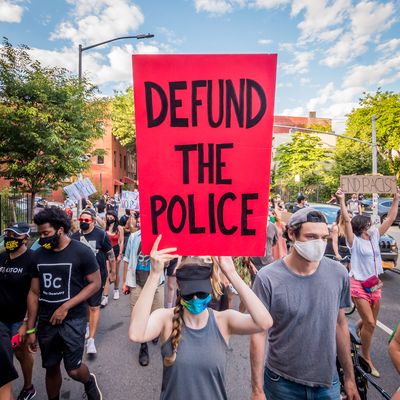
It’s been just over two weeks since a Minneapolis police officer knelt on George Floyd’s neck for eight minutes and 46 seconds, as the 46-year-old gasped for breath and then died. Floyd’s killing sparked immediate protests in Minnesota, which quickly spread around the nation and then the world. And those demonstrations have already begun to create change, with states passing new laws, cities considering calls to “defund the police,” and Confederate statues coming down. From the symbolic to the substantive, here are the changes sparked by the protest movement against police violence.
“Defund the police” is turning into more than a slogan
If there’s a phrase that has come to define the wave of protests over the past few weeks, it’s “defund the police,” a somewhat nebulous call to reduce budgets and restructure the priorities of police departments. Several cities have made practical moves toward answering this call, including Los Angeles, where Mayor Eric Garcetti is calling for $150 million in cuts to the LAPD, and New York City, where Mayor de Blasio has said funding will be shifted from the NYPD to youth and social services.
But no city has pledged a bigger change than Minneapolis, where a vetoproof majority of the City Council said over the weekend it will “begin the process of ending the Minneapolis Police Department and creating a new, transformative model for cultivating safety in Minneapolis.” It remains to be seen what that means, but Camden, New Jersey, which disbanded its police department in 2012, provides a useful model.
Democrats in Congress are proposing police reform
While moves to reduce police budgets will happen at the local level, Washington Democrats put forth their own version of police reform this week. A bill introduced Monday by House and Senate Democrats calls for altering “qualified immunity” rules, which make it virtually impossible to sue police, and banning choke holds and no-knock warrants, among other measures.
Local officials are moving to ban choke holds, no-knock warrants, and tear gas
Some local elected officials aren’t waiting for Washington to act and have already moved to update department policies. In New York, state lawmakers appear poised to repeal a law that keeps police disciplinary records from the public. In Denver, police are now banned from using choke holds and must report to supervisors any time they point their gun at someone. In California, lawmakers will attempt to ban choke holds, rubber bullets, and tear gas. And in Louisville, where 26-year-old Breonna Taylor was killed after police executed a no-knock warrant on her apartment, the Metro Council has moved to limit the use of, and potentially ban, such warrants. Kentucky Senator Rand Paul has also proposed the Justice for Breonna Taylor Act, which would ban “no knock” warrants, which police used to enter her home without identifying themselves first.
Confederate monuments are falling
A handful of Confederate monuments have been taken down in recent days as some parts of the country are once again forced to confront their celebration of a racist rebellion. So far, monuments have been removed in Alexandria, Tuscaloosa, Richmond, Louisville, Fredericksburg, and other cities. The Army is even considering changing the names of bases named for leaders of the Confederacy.
Meanwhile, a bipartisan group of Mississippi lawmakers are drafting a resolution to change the state flag, which is the last state flag in the nation to feature the Confederate battle emblem.





























